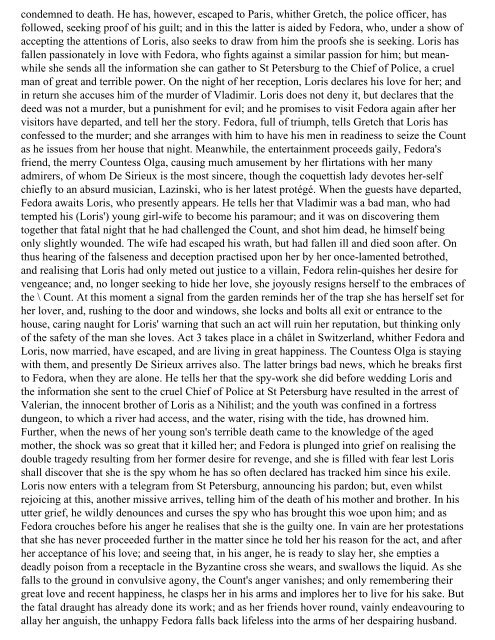Opera Plots I - MDC Faculty Home Pages
Opera Plots I - MDC Faculty Home Pages
Opera Plots I - MDC Faculty Home Pages
Create successful ePaper yourself
Turn your PDF publications into a flip-book with our unique Google optimized e-Paper software.
condemned to death. He has, however, escaped to Paris, whither Gretch, the police officer, has<br />
followed, seeking proof of his guilt; and in this the latter is aided by Fedora, who, under a show of<br />
accepting the attentions of Loris, also seeks to draw from him the proofs she is seeking. Loris has<br />
fallen passionately in love with Fedora, who fights against a similar passion for him; but meanwhile<br />
she sends all the information she can gather to St Petersburg to the Chief of Police, a cruel<br />
man of great and terrible power. On the night of her reception, Loris declares his love for her; and<br />
in return she accuses him of the murder of Vladimir. Loris does not deny it, but declares that the<br />
deed was not a murder, but a punishment for evil; and he promises to visit Fedora again after her<br />
visitors have departed, and tell her the story. Fedora, full of triumph, tells Gretch that Loris has<br />
confessed to the murder; and she arranges with him to have his men in readiness to seize the Count<br />
as he issues from her house that night. Meanwhile, the entertainment proceeds gaily, Fedora's<br />
friend, the merry Countess Olga, causing much amusement by her flirtations with her many<br />
admirers, of whom De Sirieux is the most sincere, though the coquettish lady devotes her-self<br />
chiefly to an absurd musician, Lazinski, who is her latest protégé. When the guests have departed,<br />
Fedora awaits Loris, who presently appears. He tells her that Vladimir was a bad man, who had<br />
tempted his (Loris') young girl-wife to become his paramour; and it was on discovering them<br />
together that fatal night that he had challenged the Count, and shot him dead, he himself being<br />
only slightly wounded. The wife had escaped his wrath, but had fallen ill and died soon after. On<br />
thus hearing of the falseness and deception practised upon her by her once-lamented betrothed,<br />
and realising that Loris had only meted out justice to a villain, Fedora relin-quishes her desire for<br />
vengeance; and, no longer seeking to hide her love, she joyously resigns herself to the embraces of<br />
the \ Count. At this moment a signal from the garden reminds her of the trap she has herself set for<br />
her lover, and, rushing to the door and windows, she locks and bolts all exit or entrance to the<br />
house, caring naught for Loris' warning that such an act will ruin her reputation, but thinking only<br />
of the safety of the man she loves. Act 3 takes place in a châlet in Switzerland, whither Fedora and<br />
Loris, now married, have escaped, and are living in great happiness. The Countess Olga is staying<br />
with them, and presently De Sirieux arrives also. The latter brings bad news, which he breaks first<br />
to Fedora, when they are alone. He tells her that the spy-work she did before wedding Loris and<br />
the information she sent to the cruel Chief of Police at St Petersburg have resulted in the arrest of<br />
Valerian, the innocent brother of Loris as a Nihilist; and the youth was confined in a fortress<br />
dungeon, to which a river had access, and the water, rising with the tide, has drowned him.<br />
Further, when the news of her young son's terrible death came to the knowledge of the aged<br />
mother, the shock was so great that it killed her; and Fedora is plunged into grief on realising the<br />
double tragedy resulting from her former desire for revenge, and she is filled with fear lest Loris<br />
shall discover that she is the spy whom he has so often declared has tracked him since his exile.<br />
Loris now enters with a telegram from St Petersburg, announcing his pardon; but, even whilst<br />
rejoicing at this, another missive arrives, telling him of the death of his mother and brother. In his<br />
utter grief, he wildly denounces and curses the spy who has brought this woe upon him; and as<br />
Fedora crouches before his anger he realises that she is the guilty one. In vain are her protestations<br />
that she has never proceeded further in the matter since he told her his reason for the act, and after<br />
her acceptance of his love; and seeing that, in his anger, he is ready to slay her, she empties a<br />
deadly poison from a receptacle in the Byzantine cross she wears, and swallows the liquid. As she<br />
falls to the ground in convulsive agony, the Count's anger vanishes; and only remembering their<br />
great love and recent happiness, he clasps her in his arms and implores her to live for his sake. But<br />
the fatal draught has already done its work; and as her friends hover round, vainly endeavouring to<br />
allay her anguish, the unhappy Fedora falls back lifeless into the arms of her despairing husband.













